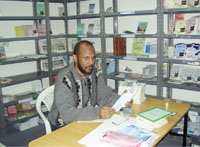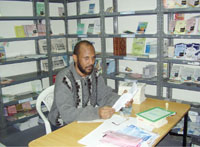
Muslim worship draws many to Islam [Archives:2007/1040/Culture]
April 9 2007
 |
The way of worship in Islam catches the attention of many. According to new Muslims, true happiness and mental peace is what they gain when they utter the Shahada: “There is no god but Allah and Mohammed is the messenger of Allah.”
The Culture Center for Foreigners' Call held a welcoming party on April 6 to meet the new converts, which include four Filipinos (three women and a man) and two Indians (a woman and her brother). The men were received in the male section, while the women were in the female section.
Such new Muslims embrace everyone heartily, as if they previously knew such faces and had been gone for a long time. The signs of happiness spread cheer among all attendees while their smiles welcome everyone to ask what attracted them to Islam.
Indian nurse converts
After living in Yemen for 15 years and working as a nurse in Taiz, Sali, an Indian woman, converted to Islam on April 3. “Whenever I've seen Muslims pray five times daily, I longed to do like them,” she recalled.
“I like Muslims for their certainty about Allah. They remember Him and praise Him, for better or for worse,” Sali adds, “People work not for materialistic gain, but for the sake of Allah.”
She is the mother of a child and her husband lives in India. For Sali, Islam now means everything in her life. When her brother came from India to visit her, she introduced Islam to him, after which he accepted and became a Muslim. Both came to the Culture Center for Foreigners' Call to learn more about Islam and get books in their mother tongue in order to learn more.
Bulgarian doctor is curious
Atanasra Petkova has been a doctor at a Sana'a hospital for three years and is one of the center's visitors. Although she is Christian, she came to the center to learn more about Islam. “What attracts me to Islam and made me curious to learn about this religion is a patient who comes to me for massage. When he leaves, many people often gather around him. When I asked others the reason for this, they replied, 'Those people are in need; therefore, they come to this man to give them money.'”
She continued, “This man gives to people without exception and for no materialistic purposes. Not only that, he's a man of high qualities. The next time, I asked him the reason for such behavior and his response was 'Islamic teaching.' He told me about this center to learn more about Islam in my mother tongue of Bulgarian.”
Islam purifies hearts, Ibn Al-Qayyim says
Umm Yousef Yahya, one of the workers at the center, explains, “Islamic instruction is interested in purifying people's hearts. The well-known scholar Ibn Al-Qayyim described this when writing:
Restraining oneself from fulfilling unlawful desires is easier than enduring that which causes pain and punishment or it will prevent a more perfect pleasure than could ever be experienced in this worldly life. Either it kills time, to the extent that it causes regret, or it defiles honor, whose preservation is more beneficial and worthy to the servant. Either it takes away some wealth that would be better saved than wasted or it derogates a reputation that would be better praised. Also, it either will remove some grace, which would be better preserved, or it debases you and makes you subservient to lowly people. Also, it causes worry, grief, fear and sadness, which are far more than the pleasure of fulfilling the desire, or it causes you to forget some knowledge that would be better remembered than satisfying one's desire. Either it makes an enemy rejoice and a friend sad or it prevents expected grace from reaching you or it causes a flaw or characteristic that will remain permanently. Indeed, deeds are the means of developing qualities and character.”
Building a solid foundation on Islam
Yahya continues, “To know Allah is for whoever wants his establishment built to Allah to be high. Al-aqeeda [belief] is the foundation of Islam, so we should take great care of it because it's according to the consolidation of the foundation that one's establishment can reach the heights and stand firm. Further, it will be able to hold the establishment, as well as add more to it. Also, when any part of the establishment is destroyed, it will be easy to repair.
“However, when the foundation isn't firm enough, the establishment won't be able to be constructed and won't be stable. When any part of the foundation is destroyed, the establishment will collapse – or it won't stand for long before it is destroyed.”
“The one who is profoundly knowledgeable about Allah will be interested in consolidating his foundation and strengthening it. An ignorant person will be interested in constructing, but without taking care of the foundation, and in no time, his establishment,” Yahya concluded.
Monotheism is important
Fatima Al-Bakri, director of the women's section at the Culture Center for Foreigners' Call, mentions that Surat Al-Ikhlas implies the importance of monotheism, also noting that Allah says in the same sura, “He begetteth not, nor is He begotten.”
She further referred to a Bible verse (New International Version) in the Gospel of Mark, chapter 12, verse 28, under the title, the Greatest Commandments: “One of the teachers of the law asked Him [Jesus], 'Of all the commandments, which is the most important?' [Jesus answered,] 'The most important one is this: “Hear, O Israel! The Lord our God is one Lord.'”
Filipino conversions
Former Christians Wafa Sobremote and Mohammed Edgardo also converted to Islam because of the way of worshiping God. “We pray five times daily and directly,” Sobremote notes.
Edgardo was puzzled about the concept of God. “A lot of questions were in my mind: Who is the true God? Is our way of worshiping God being accepted? I started searching, attending a Bible study at the Church of Christ. I discovered that Jesus isn't God, but rather a messenger and human in nature.”
Sobremote adds, “Islam respects other religions and praises Jesus, so that's why I was happy.”
Edgardo converted to Islam three weeks ago, while Sobremote converted last week with two friends of hers, Rukiya Hamran and Luryna Hamdoon.
72 years of watching
“I'm pleased to take this opportunity to tell you about myself and how I became a Muslim. I married my husband, Mohammed S. Hamran, in 1981. Although I said the Shahada then, I didn't practice Islam regularly. At that time and during all this time, I've been watching my husband and family members closely, not only praying regularly, but also performing and living their life in an Islamic way. Whenever they finish their salat, I notice their faces shining.
For 72 years, Hamran observed her husband and children performing Islamic instructions in a good manner and, according to her, no one forced her or obliged her to do something she didn't want.
She continued, “One day, I had a problem, so I talked to my husband about it and he replied, 'My help is limited, it's nothing beside your Creator's. The only one who can help whenever you're in need is Allah, but you must be obedient to Him and then he'll surely answer your call.'”
Hamran says her husband gave her everything she wanted; however, she still lacked something. “I remember the evening when I repented. I took a shower and slept peacefully that night. I got up early, like all my family members, and performed al-fajr prayer. I'm so happy since my life has started to change a little bit for the better.” However, what affected Hamran more was knowing the truth, but not accepting it.
Islam creates balance
Hana'a Al-Rahabi explains how Islamic instruction creates balance in one's life. “If we look at a good Muslim's day, we can see how Islamic instruction creates a balance between his spiritual and physical needs. In the morning, a good Muslim begins his day with al-fajr prayer, after which he goes to work feeling that Allah is with him wherever he goes or whatever he does. If something bad harms him, he is patient, whereas if he gains something good, he thanks Allah. In both cases, a good Muslim knows that Allah will reward him for his patience and his thanks.
“At al-thahr prayer, he returns to renew his faith and meet Allah spiritually. Whenever he had a problem, the Prophet Mohammed (pbuh) used to pray to gain peace and relax both his heart and mind. After al-thahr, Muslims usually rest and have lunch.
“Al-asr prayer is a call to renew the relationship and energize the soul to begin his worldly work, which he's doing for the sake of Allah, so that he'll be rewarded. When a good Muslim works to gain money and feed his family, his work is considered worship,” she notes.
“Similarly, are al-maghrib and al-asha'a prayers. Just as a Muslim begins his day in surrender to his Creator, he also ends his day by surrendering to Allah (in al-asha'a prayer),” Al-Rahabi concluded.
The Culture Center for Foreigners' Call addresses Islam in numerous languages. Additionally, various courses are held at the center, including Arabic and English courses and comparative religion.
——
[archive-e:1040-v:14-y:2007-d:2007-04-09-p:culture]


